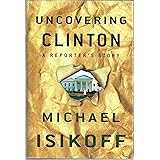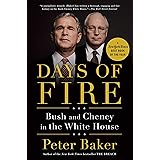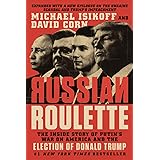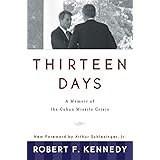
Download the free Kindle app and start reading Kindle books instantly on your smartphone, tablet, or computer - no Kindle device required.
Read instantly on your browser with Kindle for Web.
Using your mobile phone camera - scan the code below and download the Kindle app.

OK
 Audible sample Sample
Audible sample Sample 


Hubris: The Inside Story of Spin, Scandal, and the Selling of the Iraq War Audio CD – Unabridged, September 1, 2006
- Print length15 pages
- LanguageEnglish
- PublisherBlackstone Audiobooks
- Publication dateSeptember 1, 2006
- Dimensions5.32 x 1.92 x 5.78 inches
- ISBN-100786168420
- ISBN-13978-0786168422
The Amazon Book Review
Book recommendations, author interviews, editors' picks, and more. Read it now.
Similar items that may deliver to you quickly
Editorial Reviews
About the Author
Michael Isikoff is an award-winning investigative correspondent for Newsweek magazine. He is the author of the New York Times bestseller Uncovering Clinton.
David Corn is the Washington editor of Nation magazine and a well known television commentator. He is the author of the New York Times bestseller, The Lies of George W. Bush.
Stefan Rudnicki first became involved with audiobooks in 1994. Now a Grammy-winning audiobook producer, he has worked on more than three thousand audiobooks as a narrator, writer, producer, or director. He has narrated more than three hundred audiobooks. A recipient of multiple AudioFile Earphones Awards, he was presented the coveted Audie Award for solo narration in 2005, 2007, and 2014 and was named one of AudioFile's Golden Voices in 2012.
Product details
- Publisher : Blackstone Audiobooks; Unabridged edition (September 1, 2006)
- Language : English
- Audio CD : 15 pages
- ISBN-10 : 0786168420
- ISBN-13 : 978-0786168422
- Item Weight : 15.2 ounces
- Dimensions : 5.32 x 1.92 x 5.78 inches
- Best Sellers Rank: #7,148,290 in Books (See Top 100 in Books)
- #3,659 in Iraq War History (Books)
- #5,283 in United States Executive Government
- #26,476 in Communication & Media Studies
- Customer Reviews:
About the author

Michael Isikoff is an American investigative journalist, who has worked for the Washington Post, Newsweek and NBC News. He is the author of two New York Times bestsellers, Uncovering Clinton: A Reporter's Story and Hubris: The Inside Story of Spin, Scandal and the Selling of the Iraq War (co-written with David Corn.) He is a frequent guest on MSNBC, CNN, and other TV talk shows. Isikoff is currently the chief investigative correspondent for Yahoo News.
Customer reviews
Customer Reviews, including Product Star Ratings help customers to learn more about the product and decide whether it is the right product for them.
To calculate the overall star rating and percentage breakdown by star, we don’t use a simple average. Instead, our system considers things like how recent a review is and if the reviewer bought the item on Amazon. It also analyzed reviews to verify trustworthiness.
Learn more how customers reviews work on Amazon-
Top reviews
Top reviews from the United States
There was a problem filtering reviews right now. Please try again later.
Written by award winning journalists Michael Isikoff and David Corn, “Hubris” focuses on that campaign, which was based largely on deception. 9/11 had happened recently, and the American people were out for blood. So the Bush administration threw them a bone by alleging that Saddam Hussein had ties to the 9/11 terrorists if not direct knowledge of the attack beforehand, and that Iraq possessed weapons of mass destruction. The government, that is, branded Hussein a national security threat as an excuse, later proved without merit, for going to war.
America’s excursion into Iraq was costly, both in terms of human lives and money. “Hubris,” so-called because of the Bush Administration’s overwhelming confidence that their ruse would work, describes how such an arrogant stunt cost at least 190,000 lives, mostly civilian, and some $2.2 trillion in U.S. taxpayer money. The administration was already determined to go to war with Iraq. They simply needed to make the case to the American public.
The book also explores a world of intrigue – Iraqi agents meeting with al-Qaeda operatives in Prague, Iraqi spies and defectors, including one codenamed Curveball, a CIA-supported, convicted embezzler and member of the Iraqi National Congress named Ahmed Chalabi, a scandal involving dubious information from an intelligence source out of Italy alleging that Iraq tried to buy yellowcake uranium from Niger, and that it had, therefore, illegally revived the nuclear program the international community had forced it to terminate in the 1990s. U.S. diplomat Joseph Wilson went to that country to investigate the claims, but later refuted them. To compound things, a reporter outed his wife, Valerie Plame, as a CIA agent.
And that merely skims the surface.
“Hubris” is a riveting book and, indeed, another one about corrupt politicians spinning a web of lies to influence the American public. It’s very well-written and informative, thorough and thought-provoking. One could even dub it a Greek tragedy clothed in the ungodly accouterments of political Americana, its actors intoxicated on that poisonous nectar called hubris.
The book covers the serial incompetence involved in planning the Iraq war, and how specifically the intelligence community was compromised by the strong desire of the Administration to go to war. War apologists generally try to skirt details, since they are so damning; Isikoff gives you those details in several key areas. Want to recollect how the Administration twisted the fact sets on the "tubes" they accused Iraq of purchasing for centrifuges? Isikoff not only shows you what nonsense that was, but more importantly that the Administration was aware of the problems with the conclusions they were trying to sell the public. A favorite tactic? Leak "inside information" to selected journalists, and then go on Meet the Press and cite those very same news stories as "evidence" of Saddam's WMD Program(s).
"So there was Cheney on television citing the Times. He said that he could not reveal intelligence sources, but with the Times story, “it’s now public that, in fact, [Saddam] has been seeking to acquire” the tubes for his nuclear weapons enterprise. We know this, Cheney claimed, “with absolute certainty.” Millions of Meet the Press viewers could be forgiven for not realizing that Cheney was citing an article based on information that had come from his own administration. And Cheney went further by remarking that he could not say whether or not Saddam already had a nuclear weapon, leaving that an open possibility. It was a disingenuous remark, for no U.S. intelligence analyst at the time believed that Saddam had his hands on a nuclear bomb."
Many folks were astounded by the outrageous claims, but many went along for the ride."
"A CIA officer involved in the tubes episode called it a 'perfect coming together of arrogance, incompetence, and basic human error. These screw-ups happen all the time, just not with consequences this enormous."
It was not just Cheney, although his complicity in the misinformation campaign was critical. The President sold nonsense enthusiastically.
”Bush and Blair also talked about the aluminum tubes. The president assured the prime minister the IAEA was wrong to conclude that the tubes were for artillery rockets, not for a nuclear program. Bush insisted that the specifications of the tubes indicated they were indeed right for a nuclear centrifuge. And when the two talked briefly about postinvasion Iraq, Bush remarked that it was “unlikely there would be internecine warfare between the different religious and ethnic groups.” Blair agreed."
The Niger yellowcake debacle, in which, despite repeated entreaties from the CIA, the Administration continued to perpetrate the lie that Iraq had attempted to purchase a vast sum of "yellowcake" for its nuclear program, is covered with great specificity. Another detail that war apologists, and the Bush Administration prefer to forget. The pressure to ignore contrary intel on the yellowcake claim is covered in great detail, leading to the famous use of the sixteen words in a Bush State of the Union Address. A national embarrassment. The Bush Administration attempt to dump that fiasco at the feet of the CIA is fairly easily set aside.
"Eleven days previously, the White House had blamed the CIA for the sixteen words. Now aides were aware of documents showing that the national security adviser, the deputy national security adviser, and the chief speechwriter had ignored clear warnings from the CIA."
Eventually the White House would have to acknowledge that the clear and unambiguous warnings were ignored. The CIA, eager to please, gave warnings but did not do the independent job that should be expected from them. They seemed to realize, at some level, that the Administration was selling snake oil, but ultimately were compromised themselves, especially Director George Tenet. A good snippet from the book gets right to the fundamental question of what the intel actually showed, with Tenet not able to answer a simple question from Joe Biden:"But when Biden and other committee members pressed Tenet on the sourcing for these claims, they got little in the way of answers. During the questioning, a committee staff member slipped Biden a note with a suggested query, and Biden put this question to Tenet: What “technically collected” evidence did the CIA have of Iraqi weapons of mass destruction? What the staffer had in mind was physical proof: radioactive emissions from nuclear sites, electronic intercepts, samples of biological agents. Anything that would be hard and irrefutable. “None, Senator,” Tenet replied. There was a hush in the room. Oh my God, the staffer thought. “ ‘None, Senator’—that answer will ring in my ears as long as I live,” the aide remarked later. Biden appeared bothered. He asked Tenet, “George, do you want me to clear the staff out of the room?” It was a way of asking if Tenet possessed superclassified information, some technical evidence that was so black, so secret, that it couldn’t be shared."
How did we get to the idea of invading Iraq? Maybe the most important piece of this outrageous series of lies by the Administration was the role of Ahmad Chalabi, and his direct connection to the State of Iran. Chalabi led the Administration by the nose, and even when he was exposed as a total fraud continued to enjoy political support from within the Administration. And what was the connection with Iran, and their intelligence services?
"In late May, Iraqi police, supported by American soldiers, raided the Baghdad home and offices of Ahmad Chalabi, who had become a member of the Iraqi interim governing council created by the U.S. government. U.S. troops seized computers, records, and rifles from two offices of Chalabi’s Iraqi National Congress. An Iraqi judge said the raids were part of an investigation of assorted crimes: torturing people, stealing cars, seizing government facilities. One of the arrest warrants was for Aras Habib, the INC’s intelligence director. Habib had run the group’s controversial “intelligence collection program,” which had supplied fabricating defectors and bogus information to dozens of media outlets before the war. He also had been suspected by the CIA of being an Iranian agent for years—ever since Bob Baer and Maguire had dealt with him in the mid-1990s."
"As for Habib, he vanished around the time of the raid on the INC headquarters. His suspicious disappearance raised an intriguing and significant question: Had the fellow responsible for slipping bogus INC “intelligence” on Iraq’s supposed WMDs to U.S. officials and journalists—information concocted to start a war—done so at the behest of Iranian intelligence? Had the U.S. government and the American public been the target of an Iranian intelligence operation designed to nudge the United States to war? These were questions U.S. intelligence agencies never seriously investigated."
Chalabi's role is one of the greatest outrages of the adventure, and must lead to an examination of the geo-political ramifications of the war. That piece is not covered in the book, but any discussion of the war should reference the fact that the regional player most positively impacted by the U.S. invasion of Iraq was Iran. The Shia assumption of power in Iraq, and the direct connection of many of the new members of the Iraqi government to Iran, made this connection easy to discern not only while it was happening, but before the invasion as well. The neo-cons displayed a shocking lack of even the most fundamental understanding of the regional equilibrium, and how this invasion would tip that equilibrium over in a very negative way for the United States. We continue to suffer the ill effects to this very day, with the ironic twist that many of the same neo-cons who advocated the Iraqi debacle today decry the potential for regional hegemony by Iran.
Of course the Iraqi debacle contains not only the Bush Administration cooking the intel books to justify invasion, but also displaying some of the greatest incompetence in managing Iraq as an occupying power after the fall of the Saddam regime. The book highlights some of the greatest errors committed, but is not strong on post war management. For that I will re-read Bob Woodward's "State of Denial". Isikoff gives a very detailed examination of the so called Valerie Plame affair, with Bush Administration officials blowing the cover of CIA operative Valerie Plame Wilson in an attempt to discredit her husband, a vocal critic of the Bush Administration on the interpretation of the so called "Niger-Iraq Yellowcake" intel. Maybe a bit much on this subject, but certainly shows the mindset that brought us to this disaster.
A highly recommended book by an author not afraid to bring the light of day to the dishonest and incompetent handling of the Iraq debacle by the Bush Administration.










